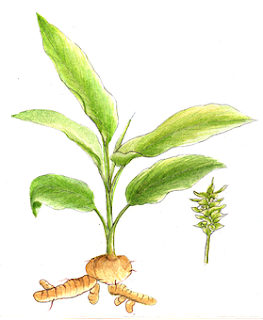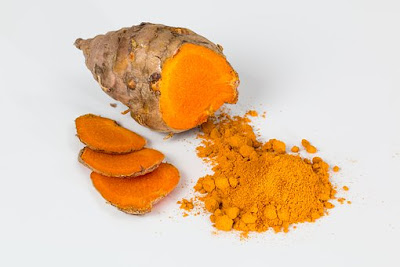Turmeric is a spice that gives flavor and yellow color to the curry powder and mustard. Turmeric (Curcuma longa) is a member of the ginger family and has been used for healing for quite some time. The healing properties can be found in the plant’s finger like stalk. The stalk is scalded and dried for herbal medicine. This same part is used to flavor, color and preserve foods.
In India and in other parts of China, turmeric has been used to treat indigestion and several other ailments for centuries. It was mainly used as a spice in other parts of the world until the 1970s. It was then that researchers discovered that it contains curcuminoids which are compounds that fight inflammation. It was also found that turmeric is rich in antioxidants. It also shows potentials in reducing cholesterol levels and combating atherosclerosis which builds up fatty deposits in the arteries and can lead to heart attack.
Preliminary studies indicate that turmeric could possibly block the progress of multiple sclerosis (MS).
Turmeric comes in different formulations of tincture, tablet, powder, ointment, lotion, liquid, dried herb/tea, cream, and capsule. Formulations that can be taken internally are capsules, fresh juice, boiled tea made from powder and tinctures. Topical formulations are creams, lotions, pastes, and ointments. Look for turmeric that contains 95% curcumin since this is effective in treating a specific ailment. In order to get the medicinal dose of 1.2 g/day of curcumin, you need to consume 100 grams of turmeric as a culinary spice.
To treat carpal tunnel syndrome, indigestion, excess gas, and other inflammatory and GI-related ailments, take 400 to 600 mg capsule three times a day. Or, you can take ½ to 1 teaspoon of liquid extract and mixed it with ½ cup of water three times a day. Continue this treatment until symptoms are gone. If you noticed no improvement after a week of use, then discontinue turmeric. To prevent cancer, use turmeric as a spice daily or sip turmeric tea.
You may also the like to the article Amazing-benefits-of-holy-basil
Once symptoms of inflammation improve, reduce the daily dose of turmeric into the half. And if symptoms are gone, stop using the herb. Turmeric is not well absorbed when taken orally so look for extracts that combine it with bromelain, a protein-digesting enzyme found in pineapples. Bromelain will make it easier for the body to absorb active compounds of turmeric.
Turmeric due to its curcumin content could interfere with the proper functioning of breast cancer chemotherapy medicine. Ask your doctor if you are taking chemotherapy drugs such as mechlorethamine, doxorubicin, and cyclophosphamide. If you have bile duct blockage or blood clotting disorder, do not take turmeric as this could affect these conditions. If you have gallstones or gallbladder problems, do not use turmeric as this could have harmful effects. Prolonged use of turmeric can cause stomach upset and other gastrointestinal upsets.
If you like the article please like and comment. Also, share it with the person who needs this information.
Proven Health Benefits of Turmeric and Curcumin
In India and in other parts of China, turmeric has been used to treat indigestion and several other ailments for centuries. It was mainly used as a spice in other parts of the world until the 1970s. It was then that researchers discovered that it contains curcuminoids which are compounds that fight inflammation. It was also found that turmeric is rich in antioxidants. It also shows potentials in reducing cholesterol levels and combating atherosclerosis which builds up fatty deposits in the arteries and can lead to heart attack.
Preliminary studies indicate that turmeric could possibly block the progress of multiple sclerosis (MS).
The specific health benefits one can derive from turmeric include:
- It relieves carpal tunnel syndrome, arthritis and joint inflammation due to its anti-inflammatory compounds.
- It eases indigestion, excess gas (flatulence), bloating and other mild upset stomach symptoms. This is because the curcumin in turmeric combats bacteria that are responsible for infectious diarrhea.
- It prevents cancer. Being an antioxidant, turmeric prevents damage to cells, in turn, preventing some types of cancer such as breast, skin, colon, and lymphoma.
 |
| Turmeric Plant |
Turmeric comes in different formulations of tincture, tablet, powder, ointment, lotion, liquid, dried herb/tea, cream, and capsule. Formulations that can be taken internally are capsules, fresh juice, boiled tea made from powder and tinctures. Topical formulations are creams, lotions, pastes, and ointments. Look for turmeric that contains 95% curcumin since this is effective in treating a specific ailment. In order to get the medicinal dose of 1.2 g/day of curcumin, you need to consume 100 grams of turmeric as a culinary spice.
To treat carpal tunnel syndrome, indigestion, excess gas, and other inflammatory and GI-related ailments, take 400 to 600 mg capsule three times a day. Or, you can take ½ to 1 teaspoon of liquid extract and mixed it with ½ cup of water three times a day. Continue this treatment until symptoms are gone. If you noticed no improvement after a week of use, then discontinue turmeric. To prevent cancer, use turmeric as a spice daily or sip turmeric tea.
You may also the like to the article Amazing-benefits-of-holy-basil
Once symptoms of inflammation improve, reduce the daily dose of turmeric into the half. And if symptoms are gone, stop using the herb. Turmeric is not well absorbed when taken orally so look for extracts that combine it with bromelain, a protein-digesting enzyme found in pineapples. Bromelain will make it easier for the body to absorb active compounds of turmeric.
Turmeric due to its curcumin content could interfere with the proper functioning of breast cancer chemotherapy medicine. Ask your doctor if you are taking chemotherapy drugs such as mechlorethamine, doxorubicin, and cyclophosphamide. If you have bile duct blockage or blood clotting disorder, do not take turmeric as this could affect these conditions. If you have gallstones or gallbladder problems, do not use turmeric as this could have harmful effects. Prolonged use of turmeric can cause stomach upset and other gastrointestinal upsets.
If you like the article please like and comment. Also, share it with the person who needs this information.














0 comments:
Post a Comment